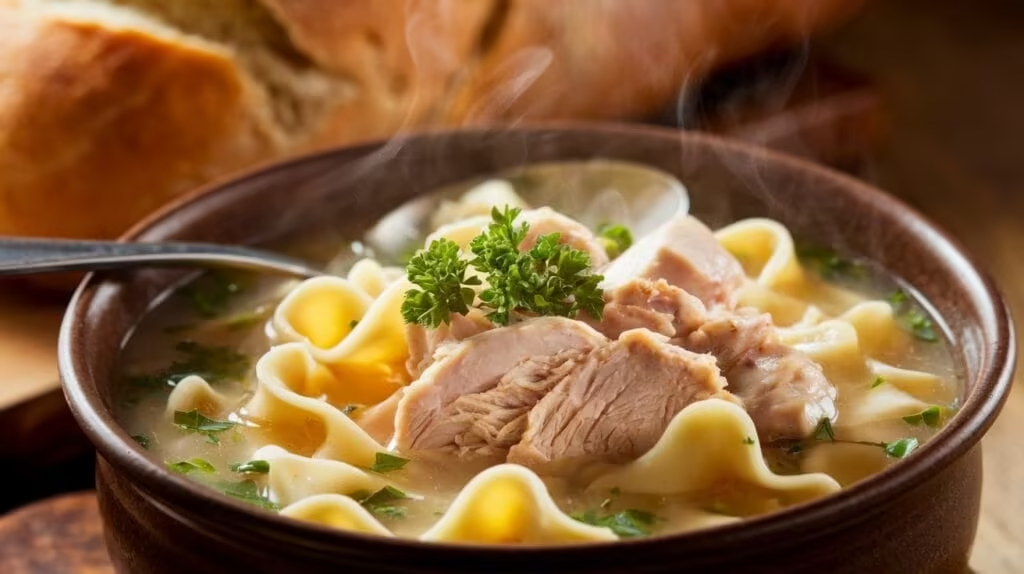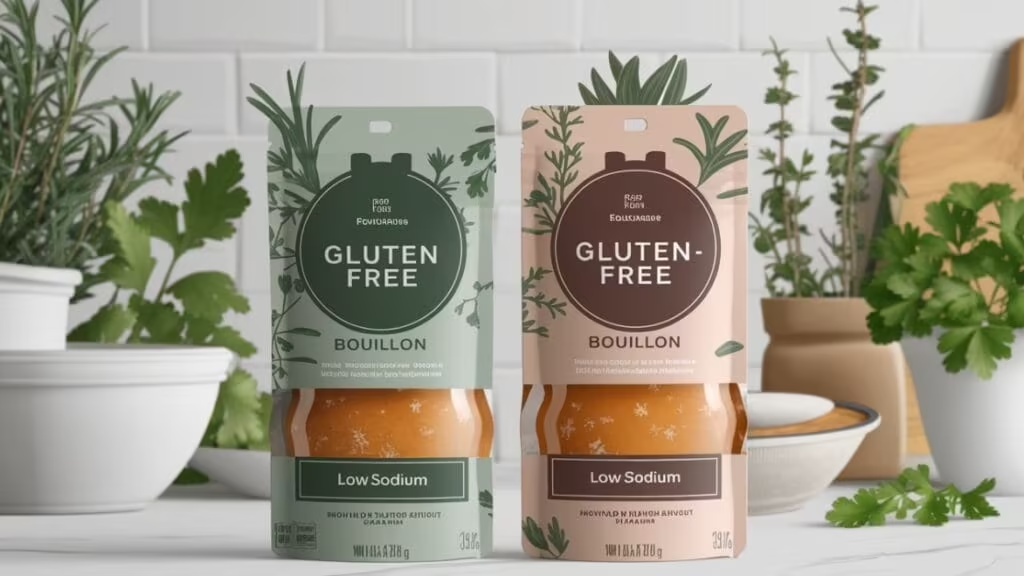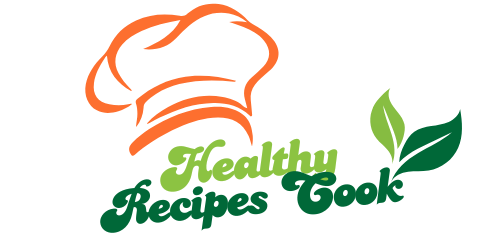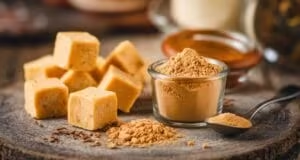Chicken bouillon is a beloved ingredient found in pantries worldwide, cherished for its ability to add depth and richness to countless recipes. Whether you’re preparing a hearty soup, a flavorful stew, or a quick weekday meal, instant chicken stock serves as a quick and versatile way to boost flavor without the need for hours of simmering stock.
Originating as a simple culinary solution to concentrate flavor, chicken bouillon has evolved into a kitchen essential. But what exactly is chicken stock cubes, and why has it become such a staple in home cooking?
Table of Contents
What is Chicken Bouillon?
Chicken bouillon refers to a concentrated flavoring derived from chicken stock or broth, typically dehydrated and packaged as cubes, granules, or powder. It’s designed to dissolve in water, creating an instant base for soups, sauces, and other dishes. More recently, liquid bouillon options have also entered the market, offering a fresh alternative.
For a deeper dive into how to balance flavor in everyday cooking, check out 10 Healthy Dinner Habits for a Balanced Life.
The Origin and Popularity of Chicken Bouillon
The concept of bouillon dates back to the 17th century, with chefs seeking ways to preserve and enhance flavor. The modern Chicken stock cube, as we know it, was popularized in the early 20th century by brands like Maggi and Knorr, which made it accessible and easy to use. Today, chicken stock cubes is a go-to choice for cooks across cultures, thanks to its convenience and ability to deliver a burst of umami flavor.
Understanding Chicken Bouillon
How Chicken Bouillon is Made
Chicken bouillon is typically created by simmering chicken, vegetables, herbs, and spices to extract their flavors. The resulting broth is then concentrated and dehydrated to produce a more shelf-stable product. The process ensures that the rich essence of chicken is retained, making it easy to incorporate into recipes.
Commercially, the production involves a mix of natural chicken extracts, salt, and seasonings, often enhanced with flavor boosters like monosodium glutamate (MSG) or yeast extract. The final product may take various forms, including cubes, powders, granules, or liquids.
Pairing instant chicken stock with grains like oatmeal can provide a unique flavor profile. Learn more in Health Benefits of Oats and Oatmeal.
Types of Chicken Bouillon: Cubes, Granules, Powder, and Liquid
- Cubes: The most common and portable form, chicken stock cubes cubes are individually wrapped and easy to use. A single cube is often enough to flavor one cup of water.
- Granules: These are finely ground and dissolve more quickly than cubes, making them ideal for recipes requiring even distribution.
- Powder: Similar to granules but finer, bouillon powder offers precise control over flavor intensity.
- Liquid: A newer form of bouillon, liquids often have a fresher taste but require refrigeration after opening. They’re ready to use, eliminating the need for dissolving.
Key Ingredients in Chicken Bouillon
The ingredients in Broth concentrate typically include:
- Chicken stock or extract: The primary flavor base.
- Salt: A preservative and flavor enhancer.
- Seasonings and spices: Ingredients like onion, garlic, and celery powder enrich the flavor.
- Fats: Often vegetable-based oils or fats for a smooth mouthfeel.
- Additives: Some versions include MSG, hydrolyzed protein, or natural flavors to enhance taste.
Uses and Benefits
Culinary Uses: Enhancing Flavor in Soups, Stews, and More

Chicken bouillon is incredibly versatile. It serves as a foundation for soups and stews but can also add depth to sauces, casseroles, and even rice dishes. It’s commonly used in:
- Soups and stews: Chicken bouillon creates a robust broth for classic chicken noodle soup or hearty stews.
- Rice and grains: Dissolving bouillon in the cooking water infuses grains like rice or quinoa with flavor.
- Sauces and gravies: A touch of bouillon can elevate the taste of cream-based or tomato-based sauces.
For creative cooking inspiration, consider exploring the idea of incorporating oats in unexpected ways, such as in these Pumpkin Oatmeal Cookies.
Nutritional Benefits and Considerations
While chicken stock cubes is celebrated for its flavor-enhancing qualities, its nutritional profile varies by brand. It’s a low-calorie option for adding taste but is often high in sodium. Some benefits include:
- Low in fat and calories: Suitable for calorie-conscious diets.
- Rich in umami: Adds a savory depth to dishes.
However, individuals watching their sodium intake should opt for low-sodium varieties.
How Chicken Bouillon Saves Time in Cooking
One of the greatest advantages of instant chicken stock is its convenience. It eliminates the need to make stock from scratch, saving time and effort without compromising on flavor. It’s a practical choice for busy cooks who need to prepare flavorful meals quickly.
Chicken Bouillon vs. Alternatives
Chicken Bouillon vs. Stock: What’s the Difference?
Though they may seem similar, chicken stock cubes and chicken stock differ in preparation and usage:
- Chicken Bouillon: A concentrated form of chicken stock, available in cubes, powders, granules, or liquid. It’s pre-seasoned, shelf-stable, and designed for convenience.
- Chicken Stock: Traditionally made by simmering chicken bones, meat, vegetables, and herbs for hours. It’s fresher but less convenient due to its short shelf life and preparation time.
Bouillon is best for quick recipes requiring an instant burst of flavor, while stock is ideal for slow-cooked dishes where depth and freshness are priorities.
Chicken bouillon provides a quicker alternative to stock, offering similar flavors but with enhanced convenience. To create meals tailored for specific dietary needs, try pairing instant chicken with gluten-free options like Mush Overnight Oats.
Comparing Chicken Bouillon with Vegetable and Beef Bouillon
Bouillon comes in various flavors to suit diverse culinary needs. Here’s how chicken bouillon compares to other types:
- Vegetable Bouillon: A plant-based alternative, suitable for vegetarian or vegan diets, with a lighter flavor profile.
- Beef Bouillon: Offers a richer, more robust taste, ideal for hearty dishes like beef stews.
Chicken bouillon remains the most versatile, pairing well with a broad range of recipes, from light soups to creamy sauces.
Homemade Bouillon vs. Store-Bought: Pros and Cons
Homemade Broth concentrate allows for customization and avoids additives, but it requires significant time and effort. Store-bought bouillon, on the other hand, is convenient and readily available but often includes preservatives and artificial flavor enhancers.
| Aspect | Homemade Bouillon | Store-Bought Bouillon |
|---|---|---|
| Flavor | Fresh, customizable | Pre-seasoned, consistent |
| Convenience | Time-consuming to prepare | Instant and shelf-stable |
| Ingredients | Natural, controlled | May contain additives |
| Cost | Economical but labor-intensive | Affordable and easy to store |
How to Use Chicken Bouillon

Tips for Incorporating Chicken Bouillon in Recipes
Using chicken bouillon effectively requires understanding its strength and salt content. Follow these tips for the best results:
- Dissolve Properly: Ensure cubes or powder are fully dissolved in hot water before adding to recipes.
- Adjust Seasoning: Bouillon is often salty, so reduce additional salt in your dishes.
- Experiment with Portions: Use less bouillon for subtle flavor or more for a richer taste.
Common Dishes Made with Chicken Bouillon
Chicken bouillon is a key ingredient in many classic dishes:
- Chicken Soup: The foundation for many variations, from creamy chicken soups to clear broths.
- Risotto: Adds depth to the broth used in this creamy Italian dish.
- Gravies and Sauces: Enhances gravies for roasted meats or pasta sauces.
Balancing Flavor: Avoiding Over-Salting
Since Broth concentrate is pre-seasoned, over-salting can be a common mistake. Avoid this by tasting dishes throughout the cooking process and using low-sodium varieties when possible.
Health and Dietary Implications

Is Chicken Bouillon Healthy? Examining Sodium Levels and Additives
Chicken bouillon is a flavorful and low-calorie option, but its health profile largely depends on the brand and variety. Key considerations include:
- Sodium Levels: Many brands contain high sodium content, which can contribute to elevated blood pressure if consumed in excess. Low-sodium options are available for those watching their intake.
- Additives: Some instant chicken products include MSG, preservatives, or artificial flavors, which might not align with natural or clean-eating preferences.
Moderation is key when incorporating bouillon into a balanced diet.
For tips on maintaining a healthy balance in your diet, discover whether eating oatmeal daily is a good choice in Is Eating Oatmeal Every Day Healthy?.
Gluten-Free and Low-Sodium Options
For individuals with dietary restrictions, several brands offer specialized options:
- Gluten-Free Bouillon: Safe for people with celiac disease or gluten sensitivities. Always check labels for hidden gluten sources.
- Low-Sodium Bouillon: Provides the same rich flavor with reduced salt, ideal for those managing their sodium intake.
These variants ensure that chicken bouillon remains accessible to a wider audience with different health needs.
Reading Labels: What to Look For in a Quality Product
Choosing the right chicken bouillon involves understanding the label. Look for:
- Natural Ingredients: Products with real chicken extract and minimal artificial additives.
- Sodium Content: Check the nutritional information to identify low-sodium options.
- Certifications: Labels like “organic,” “non-GMO,” or “gluten-free” can indicate a higher-quality product.
Opting for brands that prioritize transparency and natural ingredients can make a significant difference in flavor and health.
Buying and Storing Chicken Bouillon
Popular Brands and Varieties
Many reputable brands produce chicken bouillon, offering diverse options:
- Knorr: Known for its versatile cubes, granules, and low-sodium varieties.
- Maggi: Offers highly concentrated flavor in cubes and powders, popular in international cuisines.
- Better Than Bouillon: A paste form that delivers a fresher taste with less sodium compared to traditional cubes.
These brands provide a mix of traditional and modern solutions for every cooking style.
Storing Chicken Bouillon for Maximum Freshness
Proper storage extends the shelf life of instant chicken :
- Cubes and Granules: Keep in a cool, dry place to avoid moisture and clumping.
- Liquid Bouillon: Store in the refrigerator once opened and use within the recommended time frame.
- Homemade Bouillon: Freeze in small portions for convenience, ensuring freshness and flavor retention.
Shelf Life and Signs of Spoilage
Chicken bouillon is shelf-stable, but it’s important to monitor its quality. Signs that your bouillon may have spoiled include:
- Color Changes: A darker or uneven color could indicate degradation.
- Texture Changes: Clumping or hardening in cubes or powder may suggest moisture exposure.
- Off Smell: A sour or unusual odor signals it’s time to discard the product.
With proper care, most Broth concentrate can last for several months to years, making it a reliable pantry staple.
FAQ
Can you use chicken bouillon instead of stock?
Yes, chicken bouillon is a practical substitute for stock. Simply dissolve the recommended amount of bouillon (often one cube or one teaspoon of granules) in hot water to create a flavorful base. However, stock tends to have a fresher and more nuanced taste, which may be preferable in certain dishes like consommé or delicate soups.
Is chicken bouillon suitable for vegetarians?
Traditional Broth concentrate is not suitable for vegetarians as it contains chicken-derived ingredients. However, there are vegetarian bouillon options that mimic chicken flavor using plant-based extracts, making them a good alternative for vegetarian diets.
How much chicken bouillon should I use per cup of water?
The standard ratio for most instant chicken products is one cube or one teaspoon of granules per cup of water. However, this can vary by brand, so always check the packaging for specific instructions. For a lighter flavor, use less bouillon; for a richer taste, increase the quantity slightly.
Does chicken bouillon contain MSG?
Many traditional chicken bouillon products include MSG (monosodium glutamate) as a flavor enhancer. While MSG is generally recognized as safe, some people prefer to avoid it due to sensitivity or dietary preferences. Look for “MSG-free” labels if this is a concern.
Can chicken bouillon be frozen?
Yes, liquid and homemade chicken bouillon can be frozen for extended storage. Pour into ice cube trays or small containers for easy portioning. Once frozen, transfer the cubes to a resealable bag for convenience. Store-bought cubes or powders are shelf-stable and typically do not require freezing.
What are the best substitutes for chicken bouillon?
If you don’t have chicken bouillon, consider these alternatives:
- Chicken Stock or Broth: Fresh or canned stock offers a similar flavor profile.
- Vegetable Bouillon: A plant-based option that works well in most recipes.
- Soy Sauce or Miso Paste: Adds umami depth, though the flavor will differ.
- Homemade Bouillon: Simmer chicken, vegetables, and seasonings for a natural substitute.
Each substitute can be adjusted to suit the dish’s flavor requirements.
Conclusion
Chicken bouillon is a culinary cornerstone, offering an unparalleled combination of flavor, convenience, and versatility. From enriching soups and stews to serving as a quick seasoning solution, it has become a go-to ingredient for home cooks and professional chefs alike. While some may prefer homemade alternatives or specialty products, the ease of use and availability of Broth concentrate make it a timeless staple.
Whether you’re exploring classic recipes or experimenting with global cuisines, chicken bouillon simplifies the process of creating delicious and satisfying dishes. By understanding its uses, benefits, and dietary considerations, you can make the most of this flavorful ingredient in your kitchen.
Chicken Bouillon: A Flavorful Staple for Every Kitchen
Ingredients
- Dehydrated chicken brothSaltVegetable fatSeasonings may include onion, garlic, and herbsMonosodium glutamate (MSG) (optional, depending on the brand)
Instructions
- Dissolve chicken bouillon in hot water according to package instructions.
- Stir well to ensure even distribution.
- Use as a base for soups, stews, sauces, or to enhance the flavor of rice and pasta dishes.
Notes
- Some brands offer low-sodium or MSG-free options.
- Chicken bouillon can be used as a seasoning without dissolving in water.
- Store cubes or powder in a cool, dry place for long shelf life.


